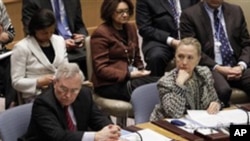“Some of the greatest threats to our security,” said U.S. Secretary of State Hillary Clinton in a speech to the Virginia Military Institute, “come from a lack of opportunity, the denial of human rights, a changing climate, strains on water, food, and energy.” In order to address these challenges, the United States is pursuing an integrated foreign policy, which includes defense, diplomacy, and development.
This three-pronged approach is being used in Afghanistan, said Secretary Clinton. The U.S. military is maintaining pressure on the Taliban to come to the negotiating table and enhancing the security capabilities of the Afghan forces. At the same, the U.S. is opening the door for Afghans to engage in an inclusive peace process that could separate the Taliban from al-Qaida and end decades of conflict in Afghanistan. And finally, the U.S. is working to lay an economic foundation for long-term, sustainable development.
Diplomacy is key to preventing conflicts before they become crises that could demand military intervention. With regard to Iran, the U.S. is committed to preventing the government from acquiring nuclear weapons and believes there is still time for sanctions and diplomacy to work. “Sustained pressure,” said Secretary Clinton, “is bringing Iran’s leaders back to the negotiating table, and we hope that it will result in a plan of action that will resolve our disagreements peacefully.”
Development remains an equal and essential pillar of U.S. national security strategy. Broad based economic growth helps build more stable societies. Research has shown that as many as 40 percent of countries recovering from conflict revert to violence within a decade. But when countries grow their economies and raise their people’s income, the risk of violence drops substantially. There is no better way of doing that than introducing free-market principles and encouraging entrepreneurship. This also includes involving women every step of the way. Half the population cannot be left behind if a country is to develop fully.
The three Ds of American foreign policy -- defense, diplomacy and development -- are hard at work making the world a safer and more prosperous place.
Making U.S. Foreign Policy Effective

“Some of the greatest threats to our security, come from a lack of opportunity, the denial of human rights, a changing climate, strains on water, food, and energy.”



